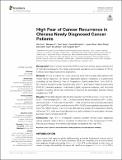Files in this item
High fear of cancer recurrence in Chinese newly diagnosed cancer patients
Item metadata
| dc.contributor.author | Luo, Xian | |
| dc.contributor.author | Li, Wengao | |
| dc.contributor.author | Yang, Yuan | |
| dc.contributor.author | Humphris, Gerald | |
| dc.contributor.author | Zeng, Lijuan | |
| dc.contributor.author | Zhang, Zijun | |
| dc.contributor.author | Garg, Samradhvi | |
| dc.contributor.author | Zhang, Bin | |
| dc.contributor.author | Sun, Hengwen | |
| dc.date.accessioned | 2020-06-24T14:30:07Z | |
| dc.date.available | 2020-06-24T14:30:07Z | |
| dc.date.issued | 2020-06-09 | |
| dc.identifier | 268667656 | |
| dc.identifier | 7b988b21-6cf5-4c96-9623-d55b42ae1683 | |
| dc.identifier | 000543855900001 | |
| dc.identifier | 85087041507 | |
| dc.identifier.citation | Luo , X , Li , W , Yang , Y , Humphris , G , Zeng , L , Zhang , Z , Garg , S , Zhang , B & Sun , H 2020 , ' High fear of cancer recurrence in Chinese newly diagnosed cancer patients ' , Frontiers in Psychology , vol. 11 , 1287 . https://doi.org/10.3389/fpsyg.2020.01287 | en |
| dc.identifier.issn | 1664-1078 | |
| dc.identifier.other | Bibtex: 10.3389/fpsyg.2020.01287 | |
| dc.identifier.other | ORCID: /0000-0002-4601-8834/work/76386744 | |
| dc.identifier.uri | https://hdl.handle.net/10023/20142 | |
| dc.description | Authors thank the President Foundation of Nanfang Hospital, Southern Medical University (2007L001), and the Guangzhou Science and Technology Project (201804010132) for funding the study. | en |
| dc.description.abstract | Background: Fear of cancer recurrence (FCR) is common among cancer patients and of high clinical relevance. This study explores the prevalence and correlates of FCR in Chinese newly diagnosed cancer population. Methods: This is a multicentre, cross-sectional study that includes 996 patients with mixed cancer diagnosis. All recently diagnosed patients completed a questionnaire consisting of the following: Fear of Progression Questionnaire-Short Form (FoP-Q-SF), General Anxiety Disorder Questionnaire (GAD-7), and Patient Health Questionnaire (PHQ-9). Univariate analyses, multivariate logistic regression analyses, and structural equation modeling (SEM) was performed to examine the association between tested variables and FCR. Results: Of the 996 patients, 643 (64.6%) reported high FCR (scored ≥ 34 in the FoP-Q-SF). Chemotherapy (OR = 1.941), Childhood severe illness experience (OR = 2.802), depressive (OR = 1.153), and anxiety (OR = 1.249) symptoms were positively associated with high FCR, while higher monthly income (OR = 0.592) was negatively associated with high FCR. SEM indicated that emotional disturbances (anxiety and depression) directly influenced FCR, while emotional disturbances partly mediated the association between personal monthly income and FCR. Conclusion: High FCR is a frequently reported problem among newly diagnosed cancer patients. Various factors increased the likelihood of the development of FCR. Flexible psychological interventions are needed for patients with high FCR. | |
| dc.format.extent | 9 | |
| dc.format.extent | 997180 | |
| dc.language.iso | eng | |
| dc.relation.ispartof | Frontiers in Psychology | en |
| dc.subject | Cancer | en |
| dc.subject | Chinese | en |
| dc.subject | Fear of recurrence | en |
| dc.subject | Newly diagnosed | en |
| dc.subject | Structural equation modeling | en |
| dc.subject | RC0254 Neoplasms. Tumors. Oncology (including Cancer) | en |
| dc.subject | BF Psychology | en |
| dc.subject | NDAS | en |
| dc.subject | SDG 3 - Good Health and Well-being | en |
| dc.subject.lcc | RC0254 | en |
| dc.subject.lcc | BF | en |
| dc.title | High fear of cancer recurrence in Chinese newly diagnosed cancer patients | en |
| dc.type | Journal article | en |
| dc.contributor.institution | University of St Andrews. School of Medicine | en |
| dc.contributor.institution | University of St Andrews. Sir James Mackenzie Institute for Early Diagnosis | en |
| dc.contributor.institution | University of St Andrews. WHO Collaborating Centre for International Child & Adolescent Health Policy | en |
| dc.contributor.institution | University of St Andrews. St Andrews Sustainability Institute | en |
| dc.contributor.institution | University of St Andrews. Population and Behavioural Science Division | en |
| dc.contributor.institution | University of St Andrews. Health Psychology | en |
| dc.identifier.doi | https://doi.org/10.3389/fpsyg.2020.01287 | |
| dc.description.status | Peer reviewed | en |
This item appears in the following Collection(s)
Items in the St Andrews Research Repository are protected by copyright, with all rights reserved, unless otherwise indicated.

